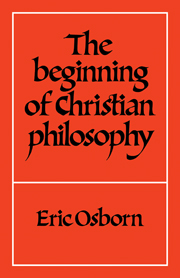Book contents
- Frontmatter
- Contents
- PREFACE
- REFERENCES
- ABBREVIATIONS
- 1 CHRISTIAN ARGUMENT
- 2 PEOPLE AND PLACES
- 3 THE GOD ABOVE
- 4 THE RATIONAL LAUGHING ANIMAL
- 5 COSMOS AND CREATION
- 6 HISTORY
- 7 THE SHORT WORD
- CONCLUSION
- APPENDIX
- BIBLIOGRAPHY
- INDEX OF BIBLICAL CITATIONS
- INDEX OF CITATIONS FROM ANCIENT AUTHORS
- INDEX OF CITATIONS FROM MODERN AUTHORS
- GENERAL INDEX
- Frontmatter
- Contents
- PREFACE
- REFERENCES
- ABBREVIATIONS
- 1 CHRISTIAN ARGUMENT
- 2 PEOPLE AND PLACES
- 3 THE GOD ABOVE
- 4 THE RATIONAL LAUGHING ANIMAL
- 5 COSMOS AND CREATION
- 6 HISTORY
- 7 THE SHORT WORD
- CONCLUSION
- APPENDIX
- BIBLIOGRAPHY
- INDEX OF BIBLICAL CITATIONS
- INDEX OF CITATIONS FROM ANCIENT AUTHORS
- INDEX OF CITATIONS FROM MODERN AUTHORS
- GENERAL INDEX
Summary
The earliest Christian writers were also the most creative; but the established ways of viewing their work have largely obscured its meaning. Two things make rediscovery possible: on the one hand there is the recent interest in second-century issues like language about God and the problem of evil, and on the other hand there is the mass of historical work done by the late Jean Daniélou and others over the last twenty-five years. As his translator claims, the relevance of the contents of Daniélou's Gospel message and Hellenistic culture is not obvious. Another step is needed, to elucidate the problems that puzzled the second-century writers and puzzle us.
Apart from Cardinal Daniélou, others have helped considerably. In Cambridge, Professors G. W. H. Lampe, C. F. D. Moule and E. G. Rupp have helped with clarity and understanding. R. P. Claude Mondésert in Lyons and Professor Ernst Käsemann in Tübingen have placed me frequently in their debt. In Rome, R. P. Antonio Orbe has allowed me to benefit from his unrivalled knowledge of Irenaeus. Closer to home, Professor John Passmore and Dr Behan McCullagh have lent guidance on the crucial issue of method. The intelligent enthusiasm of my students here has been a major factor. Dr A. Lenox-Conyngham read proofs and, with Dr David Rankin, checked references, while Mr Edwin Brown prepared the index of citations. The staff of Cambridge University Press have guided the book through the press with unfailing skill and patience.
- Type
- Chapter
- Information
- The Beginning of Christian Philosophy , pp. ix - xPublisher: Cambridge University PressPrint publication year: 1981



